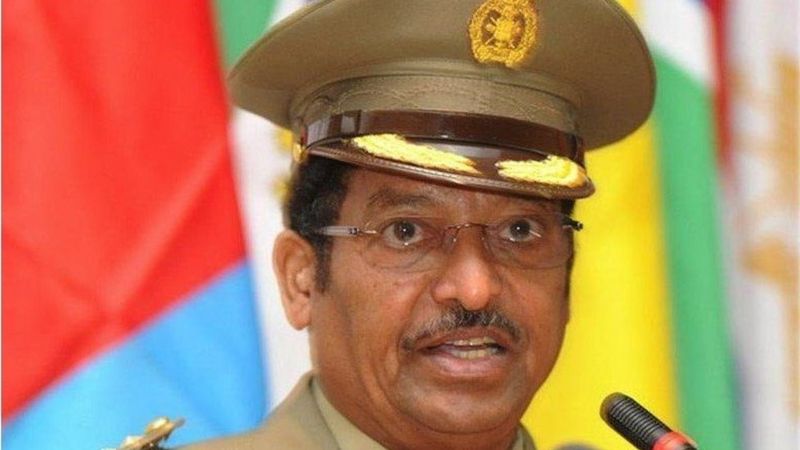-
Zmeselo
- Senior Member+
- Posts: 33606
- Joined: 30 Jul 2010, 20:43
Re: ጀነራል ፊሊጶስን ምፍንቃል ጸላእትን
Alex Isak scores twice, against Nottingham Forest.
He has now scored 6 goals in 10 matches, in his Premier League debut.





League Standings:
1 Arsenal 66pts.
2 Manchester City 61
3 Manchester United 50
4 Tottenham Hotspur 48
5 Newcastle United 47
6 Liverpool 42
Highlights:
He has now scored 6 goals in 10 matches, in his Premier League debut.





League Standings:
1 Arsenal 66pts.
2 Manchester City 61
3 Manchester United 50
4 Tottenham Hotspur 48
5 Newcastle United 47
6 Liverpool 42
Highlights:
Last edited by Zmeselo on 18 Mar 2023, 07:07, edited 3 times in total.
-
Meleket
- Member
- Posts: 3057
- Joined: 16 Feb 2018, 05:08
Re: ጀነራል ፊሊጶስን ምፍንቃል ጸላእትን
እኛ ኤርትራውያን የመሃልና የመስመር ዳኞች፡ ጀግናን ማወደስ ደስ ይለናል! ዘሜ Zmeselo "ዓቢ ሰብ" ወዲ ዓበይቲ፡ ኣስተማቕራ . . . ኣይተስተዋህዳ! 
Meleket wrote: ↑25 Aug 2021, 03:32. . . ንኤርትራ ፈውሳ! [ኤርትራዊ ግጥሚ]
‘ጎይታ’ ቢዘን ኢካ ‘ጎይታ’ ኣሶሳ፣
ኣንታ ኃዉ ዓሊ፡ ኃዉ ወዲ ፍላንሳ፣
ንተፃይ ኤሩና ደማሲሳ፣
ንተፃይ ሃገረይ ለዃሲሳ፣
እሙን ወዲ እሙናት ንሃገር ዋሕሳ፣
ማንጁስ እንከለካ ጽኑዕ ጓሳ፣
ሰብኣይ ምስኮንካሞ ጠሓሒሳ፣
ሕድሪ እተሰከምካ’ታ ኳዕናን ኣንበሳ፣
ካባካ ከውጽኡ ዝፍትኑ ኣበሳ፣
መንከ ኪኣምኖም ኢዩ’ “እዚኣ’ለዋ ሱሳ”፣
ጸላኢ መጺኡ ከይፍንጥሳ፣
ፍሊጶስስ እንከ ንኤርትራ ፈውሳ።
-
Meleket
- Member
- Posts: 3057
- Joined: 16 Feb 2018, 05:08
Re: ጀነራል ፊሊጶስን ምፍንቃል ጸላእትን
ዘሜ Zmeselo "ዓቢ ሰብ" ወዲ ዓበይቲ፡ እዚኣ ናይ እንዳ ፈለስኪኖስ ግጥሚ እስከ ነቶም "ኣምቼ" ዝበሃሉ ኣሕዋትናን ኣሓትናን ዓው ኢልኩም ንበብዎ ቢልካ ሃበልና፤ ቢልና ብኤርትራዊ ጭዉነት ሓበንን ፍናንን ንሓተኻ ኣሎና ንሕና ኤርትራውያን ደያኑ ማእከልን መስመርን! . . . . ኣስቀማቕርዋ ኣይተስተዋህድዋ'ዉን! ጅግና ምውዳስ ባህ ስለዝብለና ኢና!! 
Meleket wrote: ↑25 Aug 2021, 02:57የቢዘኑ መንፈስ [ሰሞንኛው ግርድፍ ኤርትራዊ ግጥም]
የኤርትራ ደጀን ያባሃኒ መንፈስ፣
የኤርትራ ግርማ የአዳሉ መንፈስ፣
የኤርትራ ምሽግ የደንደኑ መንፈስ፣
የኤርትራ ዋልታ የቢዘኑ መንፈስ፣
ያገሬን ጠላቶች ሚደመስስ፣
ያገሬን ልጆች ልብ፡ ሚያረሰርስ፣
ማነው የምትሉ፡ አንዱ ነው ፍሊጶስ!
የኤርትራ አንበሳ የአሶሳው ንጉስ፣
ተወልዶ ያደገው በውጊያ ቁርቁስ፣
ሃብት እንዳካበተ እንዳመለከ ቁስ፣
ስሙን ለማጠልሸት ማነው ሚያለቃቅስ?
ይልቅስ ይልቅስ ይልቅስ ይልቅስ፣
ጉድፎቻችሁን አጥሩ ያላንዳች መቅለስለስ፣
ይቺ ኣጭር ግጥም ነች የኤርትራችን መልስ።
ኤርትራ እንደሆነች ልጆቿን ታውቃለች፣
ሃገሬ እንደሆነች ሸረኛን ታውቃለች፣
ለዛም ነው መንና ዓለምን የተወች፣
አባሃኒ ደንደን ቢዘን የሰፈረች፣
ጠቀራና ሶይራ አዳል የመሸገች።
ብዙነው ዓይነቱ ሰው ሲባል ጀነራል፣
የፍሊጶስ ግና እጂጉን ይለያል፣
ለኤርትራ ሲባል መች ህይወቱን ሳስቷል፣
የኤርትራን ጠላቶች ባይኖቹ ያደባያል፣
የኤርትራ ህዝብም ከሱ ጋር ዘብ ቆሟል፣
ግራም ነፈሰ ቀኝ ጁንታ ይቀበራል፣
ትናንት ዛሬም ነገም እውነት ያሸንፋል።
-
Zmeselo
- Senior Member+
- Posts: 33606
- Joined: 30 Jul 2010, 20:43
Re: ጀነራል ፊሊጶስን ምፍንቃል ጸላእትን

HISTORY & CULTURE
A Glimpse Into Mummified Remains From Eritrea
https://shabait.com/2023/03/18/a-glimps ... eaPrevails
Mar 18, 2023
Eritrea´s rich and unparalleled heritage resources, embrace a multitude of features peculiar to the segments of human history. The presence of mummies in some of the earliest monasteries in Eritrea, for instance, represents one of the most intriguing components of the country´s patrimony. Mummies have been found in several places, such as Debre Hawaryat of Ham, Metera, Bara’knaha, and Bek’ar. The nature of these finds from the monastic complexes of Eritrea is explained here in this article, together with the description of the art of mummification elsewhere.
The word mummy came from the Persian word “Mumia,” meaning “pitch” or “bitumen” – a substance that was believed to flow from mountains in the Near East and had a curing power for diseases. The bitumen, from the famous “Mummy Mountain” in Persia, was believed to cure diseases. People eventually adopted the term to refer to the preserved bodies of ancient Egyptians, whose blackened appearance was believed to indicate that they had the same medical powers as the mumia (David, 1997).
The word Mummy, thus, came to be used for these bodies. According to its contemporary usage, a mummy is an organism’s preserved body via a natural or artificial process. Mummies can be preserved in many ways. Some mummies are preserved by natural circumstances depending on the type of climate, the dryness of the sand surrounding the body, the absence of air in the burial ground, etc.
Several mummies have also been preserved by the intervention of human activity that includes an exclusion of air and provision of a sealed environment in the burial place, using additional heat sources to dry out the body tissues and chemicals such as natron (a mixture of substances like sodium carbonate and bicarbonate) to prevent decomposition. The process involving human intervention, may vary conditionally. Yet, the basic principle of mummification can happen if a dead body dries out quickly (to discourage bacteria from growing) after death. The artificial process includes two procedures: the evisceration of the body (i.e., removal of internal organs) and dehydration. Ancient Egyptian mummification is surely distinctive of all the traditions and civilizations, that practiced mummification. The word “mummy”, often connotes Egypt and Egyptian inventions. While the Egyptian ones are the most famous, mummies have been found in many parts of the world. The fact that there are more elaborate sources about the process of mummification in Egypt than in any other parts of the world where even mummies have been found may, thus, suggest the practice originated in Egypt. The tendency to see the mummification process in the realm of Egyptian civilization is, thus, not surprising to infuse much of the narratives. Consequently, it is not a coincidence that people, in their first insight, would think of diffusion from ancient Egypt when surmising the mummies found in the monastic complexes of Eritrea. Although no scientific investigation has been done in Eritrea, mummies have been discovered in the Cultural Landscape of Qohaito, the Orthodox Christian Monastery of Debre-Libanos of Ham, Baraknaha, and recently from Bekaár in the Soira mountains. Little is known about the mummies from Qohaito, which were taken by George Schwainfurth and Max Schoeller in 1894 to Germany and are believed to be in the Anthropological Institute of Humboldt University, Berlin.
Mummies have also been recovered from the Monastery of Debre-Libanos of Ham in the 1980s, and much has been speculated about these mummies ever since. According to oral tradition, the mummified skeletal remains found in the monastic complex of Debre Libanos (Ham) included the body of Abba Libanos himself, who is believed to have founded the first monastic complex in Eritrea. This monk is believed to have come from the Middle East,aaaaaa through Alexandria (Egypt). Therefore, there is a possibility that he might have brought the practice with him. According to the monastery priests, the number of mummified skeletons in the monastery is about 120.
A recent survey around the localities of Bek’ar and Baraknaha, east and south of the town of Senafe, respectively, has enhanced our knowledge of the presence of mummies in Eritrea. The areas, believed to have housed monastic communities in antiquity, have witnessed that mummies are situated in caves of the chains of the mountain. There are contradictory sources, for the origin of mummification in Eritrea. The fact that Abba Libanos came from Egypt, where the practice is mainly known, may imply that he might have brought the practice with him.
Yet, there is no doubt that the Eritrean people had the concept of preservation a long time ago. The concept of preserving the dead bodies of organisms, has a long history in Eritrea. People used to eviscerate dead bodies to prevent decomposition, until recently.
Preserving animal flesh, skin, and tail and also plants is common. But the fact that mummies are found only in the monasteries, prevents us from safely concluding that the practice of mummification originated independently in Eritrea. According to oral tradition, the mummified skeletal remains found in the monasteries of Eritrea are bodies of the religious individuals and the ‘saints’ that inhabited them. Confinement of the preserved skeletal remains in restricted areas of monasteries, may suggest that the practice was reserved for the religious elites. The reasons for mummification in Eritrea, are still unclear. However, according to oral tradition, the bodies of some religious leaders were preserved because they were ‘saints.’ The exact time for the introduction of the practice of mummification in Eritrea, also remains obscure. But according to oral tradition, the practice might have been introduced by about c 5th to 8th c. A.D., by monks who came to Eritrea from the Middle East via Alexandria.
Whether these mummies resulted from human intervention or natural circumstances, is only to be determined by detailed scientific studies. An indication of human intervention in the mummies, has come from the presence of this knowledge in the hands of certain monks. For instance, the late Abba Teweldebrhan Andemeskel (a monk and the key informant in the preliminary study of the mummies of the monastery of Ham) had the skill of embalming through evisceration and use of local shrub Mebti’e, whose leaves were boiled to extract a liquid component. The late monk stated in the preliminary study of the mummies, that the extraction of the internal organs (the heart, kidneys, intestine, liver, stomach, and lungs) through evisceration (mqshar – in Tigrignya) and painting the body a liquid substance to help in drying the body of the organism are central to the traditional practice.
This information, however, is still fragmentary to provide conclusive remarks on the nature of the practice and, particularly, the debate of natural versus artificial procedures. The need to conduct in-depth scientific studies into the art of mummification in Eritrea in the future is, therefore, significant to sketch out clearly why and how the practice was executed and whether the practice of mummification was an indigenous or a diffused tradition as has been often suggested.
Editor’s Note: This Article was extracted from the March 2023 Edition of the Eritrean National Public Diplomacy Magazine
-
Zmeselo
- Senior Member+
- Posts: 33606
- Joined: 30 Jul 2010, 20:43
Re: ጀነራል ፊሊጶስን ምፍንቃል ጸላእትን

GENERAL
Law for Human Dignity and Development
https://shabait.com/2023/03/18/law-for- ... velopment/
Mar 18, 2023
Law has served as a medium of regulating and comprehending societal aims, values and priorities since humans started to live together in groups. It has served as the main factor in regulating the overall conduct of its subjects and as a medium of settlement of disputes, that may arise between/among members of the society. History teaches us, that societies with strong and respected laws are successful at maintaining their cohesion and realizing their vision. However, it should be noted that the efficacy of laws depends, among others, on whether these laws reflect the actual needs and values of the society.
Society is a unit, established by the assembly of people. As such, its essence is determined by the people enclosed therein. In the process of creating and branding an identity for the society, the role of humanity is prime. The identity of the people in a society, is determined through the society they belong to. Identity and the sense of ownership in a certain society, are the main elements in the building of one’s humanity.
The right to identity, is one of the various ways one’s dignity is expressed. One who doesn’t know the history of his or her ancestry, is likely to be faced with the problem of identity crisis. And a person without identity, fails to share the heritage of the society and becomes unsuccessful in shaping his or her future. Hence, the question of the relationship of these two bodies — an individual and the society to which the individual belongs — are intricate, symbiotic and mutually constitutive and one cannot claim to comprehend one without the other.
Human dignity, plays a big role in securing the benefits and maintaining the continuation of the interests of these two bodies. Because of his natural essence and being, it is rational for a human individual to get a special care from other creatures in this world. It is self-evident, that the life of an individual is inherently precious without any accessory to it. As the political, economic and social situations in a society affect this precious ‘human life’, it is important to engage while paving ways that sustain its dignity. Considering the phenomenal role of law in creating an equilibrium with the alliance of human dignity and sectoral development, it is indispensable to study the role of law.
Values are those principles that people adhere to, because of their importance in their life. They can have social, religious, moral, historical and political roots. Values, are not mere principles that human beings perceive.
They go further than that, to shape the everyday activities of human beings. Values, can be that of an individual and/ or a community (society) at large. Because the values that individuals have is shaped by their specific history, culture, political experience and economic living status, individual values are seen in the context of the collective values. In short, values are the definition of the identity of one society.
The societal values of the Eritrean people have a high degree of acceptance, because they are rooted in the culture and history of the society. They have a wide range of influence, as they touch upon the overall aspects of the life of the members of the society. They abhor crime and other unacceptable behaviors; they call for the attainment of religious duties; they strongly condemn inequity and asperity; they set rules for the healthy interactions among people; they call for people to be generous and truthful; they attach high standards to work, social welfare and cooperation. Generally, it can be said that values are the directing gear of all aspects of human life.
Without being confined to prescribing a list of rights and duties, law serves in establishing a system of values whereby a nation can influence the actions of its citizens and residents. Instead of punishing each and every transgression and negative occurrences, values can play a positive role in fostering prudent leadership and cohesive body politic. And, this is the reason why values are important.
The vision is to make Eritrea a country where justice and equality reign and important elements of human life, are not diluted to any specific measurement. Using social values as springboard, the vision aspires to achieve nation building endeavors in general. Where justice is a principle and the law is culture, serializing articles in the name of human rights, which only promote individualism, can only derail countries; especially developing countries, from their development objectives and plunge them into social crisis. Instead of transplanting the so-called “best values” of other societies as they are, the pre-existing civilized values of the local community should be preserved. It is only when the society identifies itself and creates its own identity, that it can achieve a dynamic and progressive change.
It is only when this is guaranteed, that development initiatives can become successful. Development is change that transcends quantitative measurement, and, as such, it should be assessed in terms of fair distribution of resources and equity in access to services guided by social justice rather than exclusively in terms of GDP or GNP.
A law that does not preserve the values of the society it governs and does not positively influence it, will not have a positive impact on development. A society that comprises people without guiding values and are immoral, cannot produce committed people with good work-ethic. And a society where human dignity is not guaranteed and people are reduced to a cog in a machine cannot hope to have responsible citizens, who participate in its initiatives or provide the benefit of their entrepreneurship.
While the need to draft policies and laws for every sector, as may be needed for sustainable development, is in place, taking a law-based approach to provide a comprehensive framework for development is necessary. A living standard appropriate for human beings and guarantees of respect for human life are ensured by abolishing poverty; guarantying the provision of education and health services; preventing environmental pollution; securing peace, order and justice; and safeguarding human dignity. Where this becomes a reality, success of development programs that can bring about profound change in people’s lives becomes possible.
It is this fact, that the law has striven to achieve. The fundamental principle of law, is guarantying human dignity. It underscores the importance of a values system where citizens are respected, individualism is not prioritized over the whole, and people are included in a society that holds their rights and duties in tandem.
As there is no dignity without a nation, there can be no safeguarding of human dignity without law. And for this to be possible, the law should be in sync with the norms and values of the society.
Editor’s Note: This article was prepared by the Ministry of Justice Staff in connection with the second national law week which is being underway from March 13 to March 18 under the theme, “Law for Human Dignity and development”.
__________

March 16, 2023: As part of the #LawWeek, a discussion forum was held yesterday morning at the National confederation of Eritrean Workers (NCEW) hall. A research paper, titled "Law & Citizenship", was presented by Mr. Sium Tekle and Ms. Deborah Dawit.

In the afternoon session, a research paper titled "cultural relativism of human dignity" was presented by Mr. Aman Habtzgi and Ms. Feven Yemane.

In both sessions, Comments and questions from the invited guests were entertained and discussions were held on the basis of their respective subject matter. The discussion forum also continued today 17th March, with a research paper titled "Law and development." @MoJ_Eritrea #LawForHumanDignityAndDevelopment




Today's Ministry of Justice seminar, was more than wonderful! Through it, we learned about the capabilities of our youth. @BoulisiYousuf


The Youths take the lead, during National Law Week 2023. Hanna Measho & Semhar Berhane, among the panelists. Kudos to @MoJ_Eritrea for considering an outstanding number representing women. Haben T. Abrha: @DignifiedEri
-
Zmeselo
- Senior Member+
- Posts: 33606
- Joined: 30 Jul 2010, 20:43
Re: ጀነራል ፊሊጶስን ምፍንቃል ጸላእትን




As part of the Law Week, a special program for elementary and junior school students opened yesterday at the Ministry of Justice. The program was conducted, with the aim of introducing children to the concepts of law and justice. @MoJ_Eritrea
















ትካላት ዞባ ማእከል፡ ደገፍ ን2ይ ዙሪያ ሃገራዊ ቅነ-ሕጊ ኣብ ጎደናታት ኣስመራ ብምውጻእ ስርሓተን ንህዝቢ የላልያ ኣለዋ።
-
Abe Abraham
- Senior Member
- Posts: 14412
- Joined: 05 Jun 2013, 13:00
